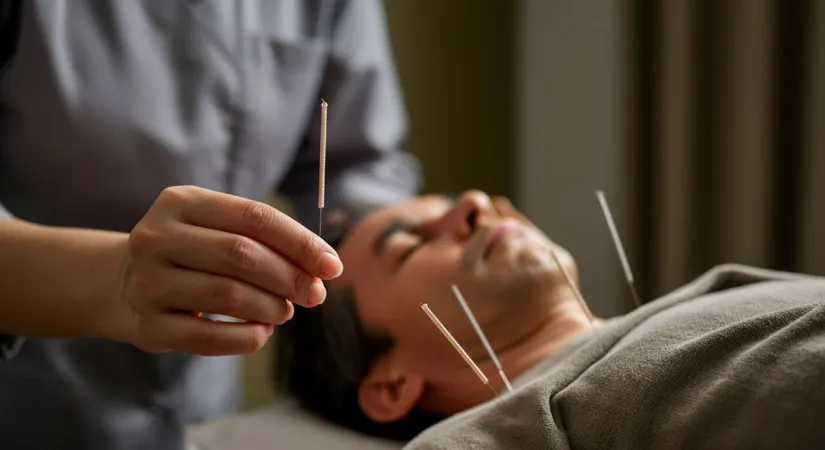Unlocking the Secrets of Acupuncture Points for Optimal Health
Learn how acupuncture points can revitalize your health and promote holistic healing.
Acupuncture, a key component of traditional Chinese medicine, has been practiced for thousands of years. It involves stimulating specific points on the body, known as acupuncture points, to promote healing and overall well-being. This cornerstone of holistic health focuses on restoring balance within the body's systems, offering a natural remedy for various ailments. As interest in natural therapies grows, understanding the role of acupuncture points can unlock a pathway to improved health and vitality.
Understanding Acupuncture Points: The Basics
Exploring the Role of Acupuncture Points in Therapy
Acupuncture points are integral to acupuncture therapy, serving as focal areas for treatment. These points are strategically located along meridians, which are channels that facilitate the flow of qi, or life energy. By targeting specific points, practitioners aim to address various health issues, from physical ailments to emotional imbalances.Key Features of Acupuncture Points
- Each point has a unique function, influencing specific organs or systems.
- Points are selected based on individual patient needs and therapeutic goals.
- Stimulation methods include needle insertion, pressure, and heat application.
Steps to Identify Acupuncture Points
- Consult traditional Chinese medicine texts to understand meridian pathways.
- Use anatomical landmarks to locate specific acupuncture points.
- Apply techniques such as palpation to confirm point sensitivity and accuracy.

How to Find Acupuncture Points for Effective Therapy
Techniques for Locating Acupuncture Points
Locating acupuncture points accurately is essential for effective acupuncture therapy. Practitioners rely on a combination of anatomical knowledge and the meridian system to pinpoint these locations. For instance, the Lung meridian, which runs along the arm, includes points that can alleviate respiratory issues. By using anatomical landmarks such as bones and muscles, practitioners can identify these points with precision.Methods for Ensuring Precision
- Palpation helps detect sensitive areas that correspond to acupuncture points.
- Electronic point finders provide feedback on point location accuracy.
- Proportional measurement ensures points are located relative to individual body size.
Steps for Personalized Acupuncture Therapy
- Conduct a comprehensive consultation to understand the patient's health history.
- Assess lifestyle factors that may influence therapy outcomes.
- Tailor the acupuncture approach to align with the patient's specific needs.

Exploring Acupuncture Points for Anxiety Relief
Understanding the Impact of Acupuncture on Anxiety
Acupuncture therapy is renowned for its ability to alleviate anxiety by targeting specific acupuncture points. These points, such as the Shen Men (HT7) on the wrist, are known to induce a calming effect on the nervous system. By stimulating these points, acupuncture activates the body's natural stress-relief mechanisms, promoting the release of endorphins and modulating neurotransmitter activity, including serotonin. This process not only helps reduce anxiety but also improves overall emotional stability.Key Acupuncture Points for Anxiety Relief
- Shen Men (HT7): Located on the wrist, it calms the mind and reduces stress.
- Yin Tang: Situated between the eyebrows, it alleviates anxiety and promotes relaxation.
- Pericardium 6 (PC6): Found on the inner forearm, it helps ease anxiety and nausea.
Steps to Enhance Anxiety Relief with Acupuncture
- Identify key acupuncture points associated with anxiety relief.
- Combine acupuncture with holistic practices like Gua Sha for enhanced benefits.
- Schedule regular sessions to maintain emotional stability and improve sleep quality.
The Role of Meridian Points in Traditional Chinese Medicine
Understanding Meridian Points and Their Functions
Meridian points, or acupuncture points, are pivotal in traditional Chinese medicine (TCM), acting as nodes for energy flow throughout the body. These points are strategically located along twelve primary meridians, each linked to a major organ system like the heart or liver. The concept is that qi, or life energy, flows through these meridians, and any disruption can lead to health issues. For example, a blockage in the liver meridian might manifest as irritability or digestive problems. By stimulating specific points, practitioners aim to restore balance and promote healing.Key Meridian Points and Their Benefits
- Liver 3 (LV3): Located on the foot, it helps alleviate stress and improve liver function.
- Heart 7 (HT7): Found on the wrist, it calms the mind and supports emotional balance.
- Lung 9 (LU9): Situated on the wrist, it boosts respiratory health and strengthens the immune system.
Steps to Harmonize Qi Flow Using Meridian Points
- Identify the meridian associated with the health issue.
- Select appropriate acupuncture points along the meridian for stimulation.
- Apply techniques such as acupressure or needle insertion to enhance qi flow.
Acupuncture's Impact on Mental Health
Enhancing Mental Health Through Acupuncture
Modern research highlights acupuncture's role in supporting mental health by enhancing the brain's biochemical balance and mitigating stress. The therapy is gaining recognition as an adjunctive treatment for depression, anxiety, and PTSD. Through stimulating specific acupuncture points, patients experience a reduction in symptoms and an improvement in their overall quality of life. The non-invasive nature of acupuncture makes it an attractive option for individuals seeking alternative or complementary modalities to pharmaceuticals. By fostering neurological harmony, acupuncture aids in stabilizing mood, enhancing cognitive function, and promoting resilience amid stress.Key Benefits of Acupuncture for Mental Health
- Reduces symptoms of depression and anxiety through natural endorphin release.
- Improves cognitive function by enhancing blood flow to the brain.
- Promotes resilience against stress by balancing neurotransmitter levels.
Steps to Integrate Acupuncture into Mental Health Care
- Consult with a licensed acupuncturist to discuss mental health goals.
- Identify specific acupuncture points that target mental health concerns.
- Schedule regular sessions to maintain mental well-being and monitor progress.
Finding Acupuncture Services Near You
Evaluating Acupuncture Practitioners for Quality Care
When seeking acupuncture therapy, it's crucial to evaluate practitioners to ensure quality care. Start by researching their credentials and certifications, which verify their training and expertise in acupuncture. Many practitioners are affiliated with wellness centers that offer integrative therapies, providing a holistic approach to health. For example, a center might combine acupuncture with yoga or nutrition counseling, enhancing overall wellness.Resources for Locating Acupuncture Services
- Online directories list certified practitioners and their specialties.
- Community health fairs often feature acupuncture demonstrations.
- Local workshops provide opportunities to learn about acupuncture benefits.
Steps to Choose the Right Acupuncture Practitioner
- Verify the practitioner's certification and training in acupuncture therapy.
- Read reviews to understand their treatment approaches and patient experiences.
- Schedule a consultation to discuss your health goals and assess compatibility.
Precision in Acupuncture Therapy: Techniques and Methods
Enhancing Health Through Acupuncture: Process Excellence
Frequently Asked Questions
What are acupuncture points and how do they work?
How can acupuncture therapy benefit mental health?
How do practitioners find acupuncture points for effective therapy?
What role do meridian points play in traditional Chinese medicine?
Can acupuncture be integrated with other holistic practices?
Discover the path to 'Healthy Beauty' with estethica's expert care. Call now for your free consultation and take the first step towards a more confident you!
📞 Call for Your Free Consultation